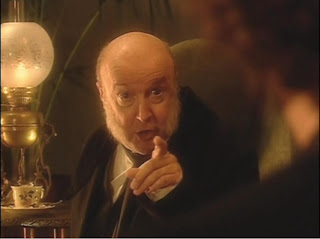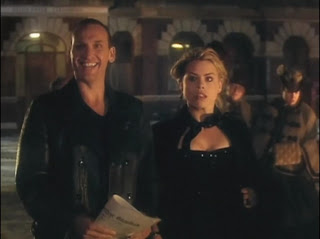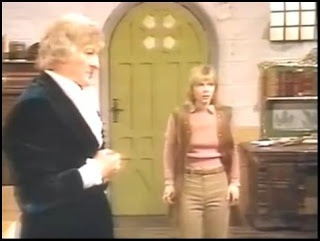The Invasion
[1960 - Season 6, Serial 3]
So, if you watch the Patrick Troughton stories in order, there's a tendency to get a little burnt out. Part of it is just how much of his first two seasons are missing, but this isn't the real problem. The real problem is that from The Moonbase in the midst of season 4 until Wheel In Space at the end of 5, they're all exactly the same. Except for David Whitaker's Evil of the Daleks and Enemy of the World, every episode is, literally, just The Moonbase: a small base is put under siege by a monstrous outside threat, but the stubborn leader of the base refuses, absolutely refuses, to listen to the Doctor about the threat, allowing the monsters to thrive. Except in different locations, (sometimes) different monsters, and usually stretched to six episodes by making the base leader take even longer to listen.
It's not that these stories are bad. All of them are at least moderately entertaining, and two of them - Web of Fear and Fury From the Deep - are superlative. But they're so endlessly repetitive that by the time you get to Season 6, you're pretty burnt out. And then you start 6, with the constant bases under siege behind you, and you get The Dominators. Which isn't quite as bad as its reputation, but only because its reputation equates it with Time and the Rani and Fear Her. The Mind Robber is, incredibly, brilliant enough to redeem all this, but it's a long, hard road.
Patrick Troughton himself was pretty burned out, and had already decided that Season 6 would be his last. Producer Innes Lloyd had moved on, leaving Derrick Sherwin as producer; Sherwin, too, wanted to move on. He was also presented a show with mediocre ratings, far below the heyday of the early Hartnell years, and an uncertain future. The Invasion was created as an attempt to prove the viability of a new format idea: modern-day earth-set stories, which had been tried out already in The War Machines and (much more successfully) The Web of Fear.
This isn’t an idea I’m terribly fond of in theory: after all, part of the attraction of Doctor Who is that you have literally all of time and space at your disposal. That said, it’s an understandable viewpoint that having literally everything, writers can easily fall into a rut of what they did last time. It’s like one of my favorite movie quotes, from Legend of 1900: “On a piano with 88 keys, you can play an infinity of songs, but on a piano with infinite keys, there’s not a song you can play.” So I suppose giving it such tight restrictions in theory would force the writers to be creative.
Granted, the writers ended up frustrated because there’s just only so much you can do with the Doctor on modern-day earth, all of which had been done by the end of their first season, and they kept trying desperately to come up with excuses to get him off-world. But that’s in the future…
The Invasion has the Doctor land on Earth after barely surviving the events of The Mind Robber. Also, having a rocket fired at them in orbit around the moon, which is a bit unusual, given that they’re in the ‘60s. (…or is it the ‘70s?) The Doctor, along with his companions, 18th century Scotsman teen Jamie and 24th century math genius teen Zoe, find that International Electromatics and its owner, Tobias Vaughan, are clearly up to no good whatsoever, but what, exactly, is going on?
 |
| You can tell he's evil because he can't open his eye all the way. |
The Invasion is a well-structured, well-written action yarn, filled with vivid characters and exciting set-pieces. It also benefits tremendously from one of Doctor Who's secret weapons, Douglas Camfield. Camfield was, without question, one of the three greatest classic Who directors, and he drives The Invasion forward with an electrifying energy and atmosphere.
The TARDIS crew stumbles onto a vast conspiracy involving a secret alien invasion carried out by an electronics company. They also meet a photographer, Isobel, who is very well drawn and totally likable. She’s one of those occasional supporting characters so likable you almost wish they would join and become a companion themselves.
It also helps that the second Doctor, Jamie, and Zoe all work very well together, and the actors have wonderful chemistry. These are all fun characters, both together and individually. Even with all the conspiratorial plotting and shadowy figures, it's them (along with Isobel) that carry the early episodes.
And then, there's Tobias Vaughan, the central villain of the piece, and an absolutely fantastic one, thanks largely the Kevin Stoney's wonderfully oily performance. Vaughan has been planning and aiding a secret alien invasion for years, quietly biding his time to double-cross his allies and take over the world himself. It’s the sort of motivation that can be dull, but Stoney gives him life and depth, while remaining creepily unnerving. His dialogues with Troughton absolutely crackle.
And then, in episode four, when the story really gets rolling, it's a doozy. The twist at the end of episode four was spoiled for me (and, in fact, everything in the world has gone out of its way to spoil it for everyone, but I have some integrity for spoiling 41-year-old low-budget TV programs), but it’s still very cool.
SPOILER
It’s Cybermen. Totally Cybermen. They’re even more threatening than usual and very well used, mostly because they barely appear. Their few scenes onscreen are gripping, and their emergence from the sewers is one of the iconic Who scenes from the ‘60s for good reason.
END SPOILER
What makes the surprise villains really work, oddly enough, is that they’re kept in the background. The central villains are Vaughan and the beautifully designed computer controller.
 |
| The awesome computer controller. |
Patrick Troughton’s Second Doctor is near his peak here. Troughton had an occasional tendency to be too clownish or overdo the bluster and bumbling. But he has the mixture perfect here: just enough of the bluster to give humor and even vulnerability to the Doctor, but plenty of his darker, more serious side. It’s a blast.
And the gradual reveal of the plot is terrific. Episode four is absolutely gripping, building to a great cliffhanger. The next two episodes match it for suspense, leading to that classic cliffhanger in episode six. Those three episodes are just brilliant. I especially like the long period of silence just before the invasion begins.
Unfortunately, the resolution isn’t nearly as strong. The ideas are all good, but the desperate attempt to stop the invasion by the few conscious humans are far less riveting than they should be. Camfield still fills it with exciting scenes, but the writing in the closing episodes just doesn't match that in the first six. Still, the scenes of Troughton and Vaughan running through Cybermen-infested building complexes are great, and the stuff with the rockets is good. It's not quite as thrilling or engaging as it should be, but it's still fun.
 |
| Especially this bit right here. |
And its importance to the show is noteworthy: it was the dress rehersal for the early Perwee years, and it works pretty well. It’s always a delight to see Lethbridge-Stewart (only a Colonel here), thanks to Nicholas Courtney’s always wonderful performances. UNIT is fairly well-served in its first real appearance, and it’s obvious even here why Courtney became one of the regulars in the ‘70s.
 |
| And look! Sergeant, er... Corporal Benton! |
A great yarn, all in all.
RATING:
* * * ½
SIDENOTES
· I like the scene where Zoe kills computer with uncalculatable problems. It’s a good variation on an idea that’s become a joke.
· The music is strange. It was written by Don Harper instead of series regular Dudley Simpson. For a while, it’s good if a bit bizarre, coming off as a clever, eclectic way of approaching the series. Unfortunately, while Harper’s music is fine during quiet suspense scenes, it’s poor during action, and ruins several key moments.
· There’s a great little moment foreshadowing the Seventh Doctor: the Doctor here seems to know (or at least strongly suspect) exactly what’s going on pretty early, but refuses to tell his companions. Later, when he tells Zoe, she says, “That’s what you suspected, isn’t it?” The Doctor sort of avoids her gaze, and the scene moves on. Obviously, it isn’t to the same extreme, since Ace eventually started getting outright furious at Seven’s constant manipulations of everyone, including her.
· I praised Stoney very highly up there, and I’d like to emphasize how much his skilled, intriguing, and nicely restrained performance adds to the story. But there is a moment in Episode 5 when he goes way, way over the top, and it doesn’t work at all.
 |
| This may just be the funniest moment in the story. |
· Love this dialogue between Isobel and the Brig:
ISOBEL: All I need is my cameras from the house and I’m all set.
BRIGADIER: Well, now, wait a minute. This is hardly a job for you.
ISOBEL: Whyever not?
BRIGADIER: Well, uh, you’re a young woman. This is a job for my men.
ISOBEL: Of all the bigoted, antifeminist, cretinous remarks!
BRIGADIER: This is no job for a girl like you, that’s final!
ISOBEL: Why, you… you… you Man!
· Many of the ‘60s episodes are missing due to the BBC’s policy of wiping tapes for re-use in the ‘70s, apparently never thinking that people might want to watch them again. Fortunately, fans recorded the audio of every missing episode during the original transmissions, so we have the sound from every missing episode. For The Invasion, the missing episodes (1 & 4) were recreated for the DVD with flash animation, and for the most part, it works pretty well.
 |
| The Doctor, Jamie, and Bad Guy in cartoon form. |
They generally do a nice job of following the filming styles of the series while occasionally taking advantage of the medium to do shots they never could have had the time or money for in the actual filming.
It doesn’t work as well in the scene following the above, unfortunately; bad guys shooting machine guns at the roof the good guys are standing on should be exciting and dynamic, but it feels like they ran out of time before this scene. Ah well; most of it works beautifully.
· Amongst its other special features, the DVD has the filmed narrations from Nicholas Courtney covering the missing material in episodes 1 & 4 created for the 1993 VHS release. This is a nice addition anyway, but I smiled when I saw in the credits that John Nathan-Turner wrote and produced the linking material. It’s always nice to remember that for all the mistakes JNT made producing the show (and he made some doozies), he really, truly cared about Doctor Who and did many things right. Here, even years after the show was cancelled, he was still pouring his time and effort into a show that had practically become his life for over a decade.




















































